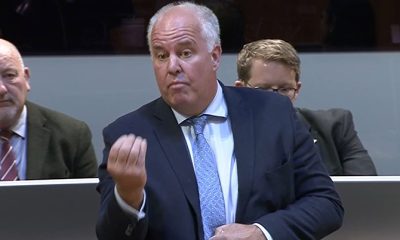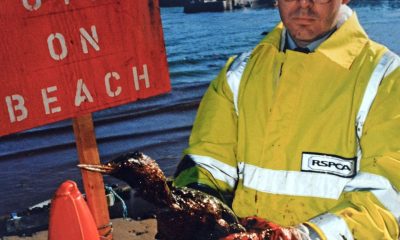News
First Minister election ballot closed

THE SPECULATION as to who will succeed Carwyn Jones as First Minister of Wales will soon conclude, as the ballot has now closed, with the result to be announced on Thursday (Dec 6).
Eluned Morgan, Vaughan Gething and Mark Drakeford have each put themselves forward for the leadership of the Welsh Labour Party and indeed the Assembly.
All three are currently members of the Welsh Government, with Ms Morgan acting as Minister for the Welsh Language and Lifelong Learning, Mr Gething as the Health Secretary and Mr Drakeford as Finance Secretary.
Mr Drakeford, 64, has styled himself as a ’21st Century socialist’, offering continuity and stability as a candidate, having worked as a Welsh Government special advisor under Rhodri Morgan and being the only Welsh Government cabinet minister to support Jeremy Corbyn when he ran for the UK Labour leadership in 2015.
The AM for Cardiff West has been in the Assembly since 2011, becoming Health Minister in 2013 before becoming Finance Secretary in 2016. His policies include an extension of the smoking ban to outdoor areas such as restaurants and town centres, the cutting of emissions through greater emphasis on public transport and building on Superfast Cymru – a scheme to rollout 733,000 homes and businesses across Wales.
Mr Gething, 44, in contrast, is championing the idea of change to prevent stagnation in a party that has been in power for nearly two decades. The AM for Cardiff South and Penarth has proposed policies including a national care service for elderly people, the removal of tuition fees for care leavers, provision of free school meals outside of term time to end “holiday hunger”, and expansion of the Welsh Government’s childcare offer to parents undertaking work-related education and training. Mr Gething has also supported giving 16 and 17-year-olds the right to vote, and would like to see compulsory voting, as there is in countries such as Belgium and Australia.
Having joined the Assembly in 2011, Mr Gething became a Deputy Minister for Health in 2014 and Health Secretary in 2016.
The third candidate, Ms Morgan, has emphasised that the ideas put forward in her manifesto had been generated as a result of a listening exercise that she had conducted throughout Wales, ensuring that the proposed policies had grass roots support from beyond the bubble of Cardiff Bay. The AM for Mid and West Wales was determined to ensure that the creation of quality jobs and eradicating poverty was put front and centre of her manifesto commitments.
Ms Morgan, 51, prioritised five key themes which she believes will help to transform Wales for the future. Her vision aims tackle poverty and drive economic growth; care for the people of Wales; unite both the party and the nation; promote Wales as a confident green nation and prepare the country for a rapidly changing world. Ms Morgan became the youngest MEP when she was elected to European Parliament in 1994. In 2010 it was announced that Morgan had been granted a life peerage by the then Labour Party leader Ed Miliband. She has served as Shadow Minister for Wales in the House of Lords and Shadow Minister for Foreign Affairs, was elected to Assembly in 2016 and became Welsh Language Minister in 2016.
Ms Morgan supports another referendum on whether the UK leaves the EU, but also believes her time in the European Parliament had given her international contacts that would have use whether Brexit happens or not. Likewise Mr Gething supports the People’s Vote campaign, yet has been criticised for previously failing to backing a Plaid motion on the issue in the Senedd. Mr Drakeford, however, is less set on another vote, saying he would only back it should the final deal fail to protect workers’ rights. As Finance Secretary, Mr Drakeford has been in charge of much of the Welsh Government’s approach towards Brexit so far.
Voting papers were sent to Labour members in Wales, as well as members of affiliated organisations and trade unions. For the first time, Welsh Labour have utilised the one-member-one-vote system, already used Labour in the rest of Britain and the method used to elect Jeremy Corbyn as the party’s UK leader. Previously an electoral college process has been used for such contests, which split the votes three ways between members, unions and politicians.
Charity
Christmas jumper day fundraiser helps support lifesaving volunteer service

A WEST WALES charity that delivers blood, medication and urgent medical supplies for the NHS has received a welcome funding boost thanks to the generosity of local driving examiners and instructors.
Blood Bikes Wales has thanked the West Wales Driving Examiners for raising money through a festive Christmas Jumper Day, with additional contributions from Approved Driving Instructors and staff from the Driver and Vehicle Standards Agency.
The fundraising effort has resulted in a sizeable donation that the charity says will go directly towards keeping its volunteer-run service on the road.
Blood Bikes Wales provides a free out-of-hours courier service for the NHS, transporting blood, samples, donor breast milk, medication and other urgent items between hospitals and healthcare sites. The service helps reduce costs for the health service while ensuring patients receive time-critical treatment as quickly as possible.
Mark, the charity’s West Area Representative, accepted the cheque on behalf of the organisation at a small presentation outside the local driving test centre.
A spokesperson for Blood Bikes Wales said the support would “go a long way in helping us continue supporting NHS services and patients across the region”.
They added: “We’re truly grateful for the generosity and community spirit shown by the West Wales Driving Examiners, local ADIs and DVSA staff. Every donation helps keep our bikes fuelled, maintained and ready to respond when the NHS calls.”
The group added a light-hearted note about the day, joking that while there may not have been an official “pass mark” for festive knitwear, the examiners would certainly have earned top marks.
Blood Bikes Wales is powered entirely by volunteers, who give up their time to carry out thousands of deliveries each year, often late at night and in poor weather conditions.
Anyone interested in supporting the charity, either through donations or volunteering, can find more information on the Blood Bikes Wales website.
News
Protest at Senedd as climate groups clash on how Wales should go green

Campaigners demand landscape protection and underground cables while environmentalists warn Wales cannot slow the clean energy transition
A PROTEST took place outside Senedd Cymru on Wednesday (Feb 11) as campaigners gathered to oppose large-scale wind farms, energy parks and new overhead pylons across rural Wales.
Residents from mid and west Wales, including farming families, countryside groups and community activists, assembled on the steps of the Welsh Parliament holding banners reading “Hands off Mid Wales”, “Rural life matters” and “Protect Welsh bogs”.

Many said they support renewable energy in principle but fear that current proposals would industrialise rural landscapes while delivering little benefit to local people.
Among those addressing the crowd was Jane Dodds, leader of the Welsh Liberal Democrats, who renewed calls for ministers to require electricity cables to be placed underground rather than carried on new lines of pylons.

Calls for underground cables
Dodds said Wales must not lose its countryside in the rush to decarbonise.
“We cannot afford to lose our countryside,” she told protesters. “Once these wind turbines and pylons are in place, the impact on our landscapes will be long lasting and, in many cases, irreversible.
“Local people feel their concerns are being overlooked while large developers push ahead with major projects. That is not how the transition to green energy should work.”
She pointed to a recent budget agreement which secured £1 million for a Visual Impact Innovation Fund to trial undergrounding technologies and explore alternatives to overhead infrastructure in sensitive areas.
“We need a balanced approach,” she said. “We must move away from fossil fuels, but we must also protect the beauty and character of rural Wales.”
Why people are protesting
Speakers and attendees raised concerns about:
• visual impact of turbines and pylons on open countryside
• effects on peatland, wildlife and habitats
• loss of productive farmland
• heavy construction traffic through small villages
• profits flowing to distant shareholders rather than host communities
Several campaigners argued that decisions feel “done to” communities rather than shaped with them, with limited consultation and little long-term return.
Some called for smaller-scale, locally owned schemes instead of what they described as “mega-projects”.
Climate groups defend renewables
In response to the protest, Climate Cymru said Wales must not step back from wind power and other renewables, warning that continued reliance on fossil fuels would worsen both the climate and cost-of-living crises.
Stan Townsend, spokesperson for the group, said: “Rising energy bills and energy insecurity are already affecting families, farmers and businesses across the country.
“Turning away from renewables would mean deeper dependence on volatile, expensive, polluting fossil fuels. We need clean, home-grown energy to protect people and the planet.”
He said Wales has some of the best wind resources in Europe and a major opportunity to cut bills, create skilled jobs and strengthen energy security.
Community ownership ‘key to support’
Community Energy Wales said many objections could be eased if local people had ownership or a financial stake in developments.
Leanne Wood, co-executive director, said: “If communities can part own developments, many of the objections to new wind turbines can be overcome. Ownership brings control.
“This would lock the profits into those communities and potentially reduce bills.”
The organisation is working to enable locally generated renewable electricity to be sold directly to local consumers so that wealth stays within towns and villages.
A wider debate
The demonstration highlights a growing divide over how Wales meets its net zero targets.
While environmental groups stress the urgent need to expand renewable energy quickly, rural campaigners say the Wales-wide push must not come at the expense of landscapes, farming and community consent.
Dodds urged the Welsh Government to strengthen planning, consultation and benefit schemes so that communities see clear advantages.
For many at the Senedd, the message was clear: renewable energy is necessary — but only if local people share the control, the profits and the decisions.
News
West Wales Together Alliance launch in Haverfordwest

A NEW alliance bringing together community groups, trade unions, faith leaders and campaigners from across west Wales is set to launch in Haverfordwest next month.
The West Wales branch of the Together Alliance will officially begin with a public meeting at 7:00pm on Wednesday (Feb 18) at Haverfordwest Mosque, Cherry Grove.
Organisers say the event will unite local politicians, farmers, artists, anti-racist organisations and faith groups in response to what they describe as growing “voices of division” in national and local politics.
In a statement, the alliance said: “Those who preach division are becoming more confident. Their false promises seize on very real economic problems and scapegoat migrants, Muslims and refugees.
“But we can change things together. The voices of unity can grow stronger. Strength lies in solidarity and working together for hope, not despair.”
The group aims to build cooperation between communities and challenge racism and extremism through grassroots organising. It says hundreds of organisations and individuals nationwide have already signed up.
The Haverfordwest launch forms part of a wider mobilisation ahead of a major national demonstration planned for London on March 28.
Several high-profile supporters have also backed the campaign, including comedian and campaigner Lenny Henry, who said: “We stand for love over hate, hope over fear and unity over division. We’re coming together against racism.”
Singer Paloma Faith added: “There is no world that I want to live in where discrimination is acceptable for anything.”
Organisers say anyone interested in promoting inclusion, equality and community solidarity is welcome to attend.

-

 Health6 days ago
Health6 days agoHealth board targets rise in steroid and gym drug use across west Wales
-

 Health11 hours ago
Health11 hours agoHealth Board to decide future of nine key services at two-day meeting
-

 Crime6 days ago
Crime6 days agoTeacher injured and teenager arrested for attempted murder at Milford Haven School
-

 Business2 days ago
Business2 days agoComputer Solutions Wales under fire from customers
-

 Business5 days ago
Business5 days agoSix-figure negligence victory leaves retired builder trapped in divorce limbo
-

 News7 days ago
News7 days agoReform appoints Dan Thomas to lead party in Wales
-

 Sport7 days ago
Sport7 days agoWales name squad for Six Nations opener against England
-

 News6 days ago
News6 days agoAnother Senedd member defects to Reform as Lib Dem MP hits out







































